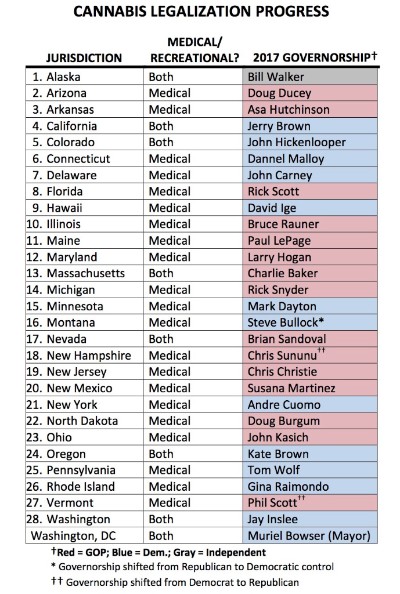In these Cannabis Law Updates, Rogoway Law will keep you informed of the latest developments and address their importance to those actually involved in the California cannabis industry. Here, now that California voters have passed Proposition 64 and the nation has elected Donald Trump to be President, we highlight three issues: (1) the impact of Prop. 64; (2) the impact of the federal election; and (3) state-level trends.
Impact of State Election: Big Changes for Everyone
- With the passage of Proposition 64, it is now legal for anyone 21 or older to possess up to 28.5 grams of cannabis flower or 8 grams of concentrated cannabis, to give away those same amounts to adults 21 or older, or to cultivate up to 6 plants.
- Individuals previously convicted of felonies for possession, cultivation, possession for sale, or transportation of cannabis may petition the sentencing court to recall or dismiss their convictions.
- Starting in 2018, California will issue licenses to recreational cannabis cultivators, dispensaries, distributors, manufacturers, transporters, and testing facilities. In the meantime, California law continues to require compliance with the medical cannabis regime.
- A new “Bureau of Marijuana Control” will begin writing regulations in the coming months–implementing Proposition 64 will take years–stay tuned.
Impact of Federal Election: Unclear, but Unlikely Bad
- The Executive Branch. During the Obama administration, federal enforcement shifted away from interference with state legalization efforts and focused on federal priorities such as preventing diversion of cannabis to other states and preventing cannabis revenue from going to criminal enterprises. Trump’s Attorney General could change that approach, but while President-elect Trump has made statements both in favor and against legalization efforts, he has generally supported the states’ rights to choose their approaches to cannabis. And while potential Attorney General pick Rudy Giuliani has voiced significant opposition to medical cannabis, most of those statements are several years old.
- The Legislative Branch. For nearly two years, an amendment included in 2014 and2015 federal spending bills has prohibited the Department of Justice from using any funds to interfere with the states’ medical cannabis regimes. This has effectively prevented the Drug Enforcement Agency from enforcing the federal cannabis prohibition against state-authorized use, distribution, possession, or cultivation of medical marijuana. Because neither the House nor Senate experienced significant turnover this election year, Congress is likely to reauthorize this restriction. Various organizations have set up web pages you can use to contact your elected officials and urge Congress to do so.
- The Judicial Branch. We caution, however, that President Trump will appoint at least one Supreme Court Justice. This means that a conservative-dominated Court could review the holding in United States v. McIntosh, in which the Ninth Circuit essentially barred federal prosecution for state-legal medical marijuana conduct. If the Court overturns United States v. McIntosh, federal prosecution for such conduct may again be possible.
What Is the National Political Climate Around Cannabis Post Proposition 64?
The 2016 election saw California, Massachusetts, and Nevada join Alaska, Colorado, Oregon, Washington, and Washington, DC, among the states with recreational cannabis. Nationally, public support for legalization is as high as 60 percent. The 2016 election reflected that broad public support and accelerated the legalization trend, with the percentage of the U.S. population living in states that with recreational cannabis laws swelling from about 5 percent to over 25 percent. Cannabis is now legal to some degree (medically only or recreationally as well) in 28 states and Washington, DC. Moreover, there is reason to expect the state-level trend to begin affecting national politics and public policy to a greater degree going forward. Below is a table showing which party holds the governorship in each state that has legalized cannabis in some form.

As you can see, a majority of these states have a Republican governor. While there is no formal, legal importance of each governor’s party affiliation, it is clear that the ongoing tension between federal and state cannabis laws does not pit Democrats against Republicans. The fact that this is a bipartisan issue—and perhaps one of the few such issues with considerable momentum on a national level—bodes well for the states’ overall ability to influence the new Republican administration to respect each state’s individual choice with respect to its cannabis laws.



